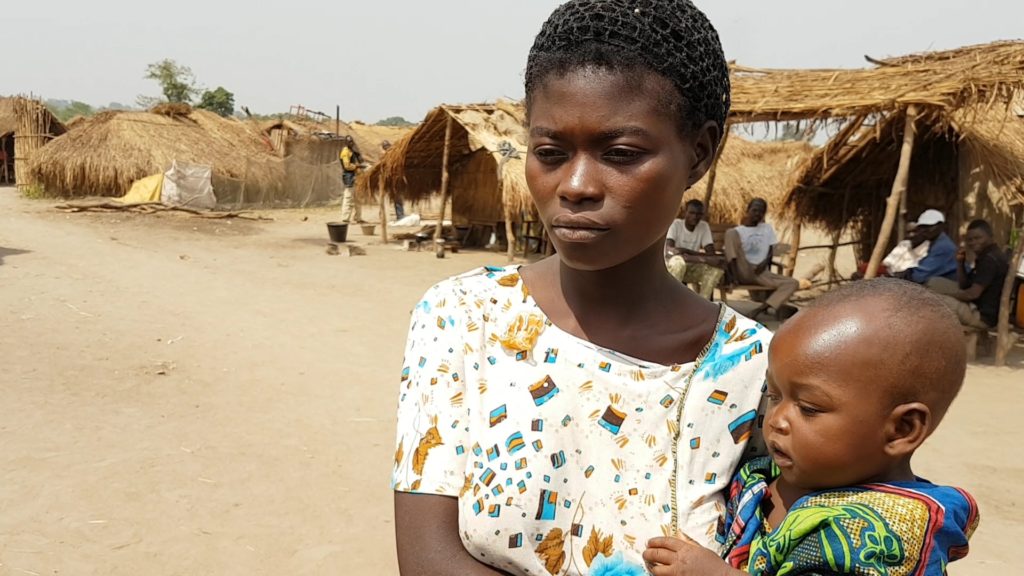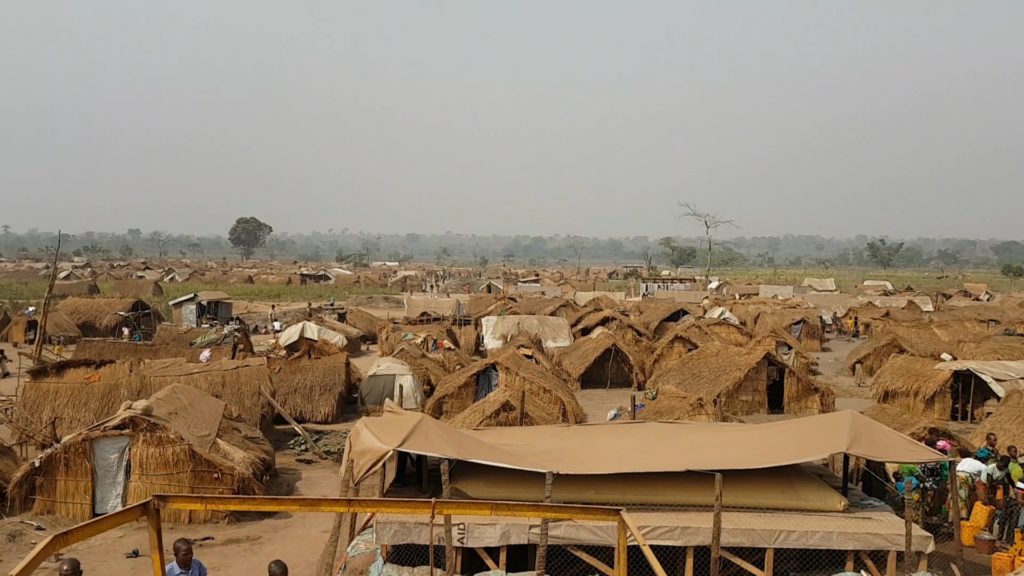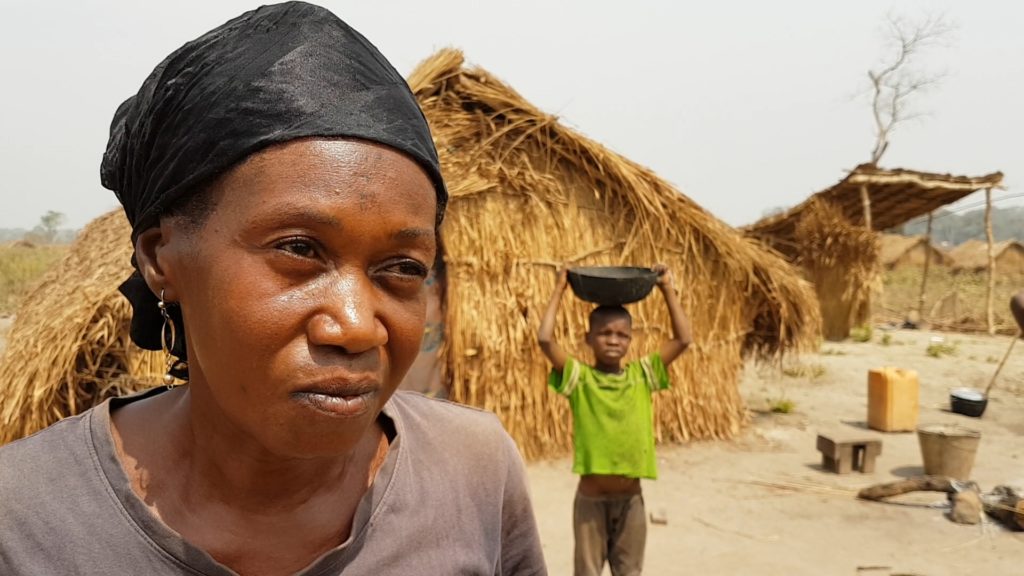
Last month, April, saw the worst violence for years in the Central African Republic, said Medecins sans Frontieres. The UN, which has a 13,000 safe-keeping mission (MINUSCA) in the former French colony, has sought to disperse fighters, while the United States has imposed sanctions on CAR militia leaders.
Despite the March election that was supposed to restore stability, the situation is still fragile and large portions of CAR’s territory in the north and north east are controlled by ex-Seleka rebels.
In October 2016, 23 Christians were killed – many hacked or stabbed to death – during an attack by largely Muslim ex-Seleka militia in Kaga Bandoro, 350km north of the capital, Bangui.
If nearby UN forces hadn’t intervened, there could have been many more deaths.
The October attacks led to 14,000 more Christians seeking refuge in the town’s Internally Displaced People (IDP) camp, close to the UN peacekeeping base, taking the population to 18,000.
This report from Nathan* of Christian charity, Open Doors, finds residents in the camp living under extreme pressure and constant fear of renewed attack.
“It is not often I receive assignments to travel to dangerous areas as easy to reach as the internally displaced Christians in Kaga Bandoro. If you can get a seat on a UN flight, it is easy to reach the 18,000 desperate Christians in the IDP camp conveniently located at the end of the local airstrip. My interpreter and I can fly in, conduct interviews and, a few hours later, fly back to the safety of Bangui.
”A group of 10 pastors welcomes us and they walk us to a tent that is nothing more than poles and sticks, with a roof made from food sacks sewn together to shield from the sun. It serves as a church. Inside, about 60 other pastors and elders greet us with enthusiastic singing and clapping.
“Then I’m given a tour to see what life looks like for IDPs in this part of CAR, which is under ex-Seleka control.
“Tens of thousands live with the bare minimum of food and shelter on this small piece of scorched earth. Some sort of a roof shields them from sun and rain, but provides little privacy. And some sort of food keeps them from starvation, though it is never enough to keep them and their children from having to go to bed hungry.
“It is difficult to maintain dignity under these circumstances. In a typical African village people usually have space around their houses where they grow food, keep animals, and, most importantly, live how they want. Mothers teach daughters home-making skills; fathers teach sons how to provide. But in an IDP camp, all that space and privacy is lost. While the roof can shield you from the sun, there is nothing to shield their children’s eyes from things they don’t want them to see. It’s difficult for parents to keep up family life and values in six square meters.
“I have seen these conditions across Africa. More often than not, prolonged camp life disrupts family life and social structures. Out of boredom, fathers can turn to drinking and prostitutes. Children can get out of control.

“But as I walk around the hundreds of identical grass-thatched huts, I am surprised to see a high level of organisation and order. I see no traces of alcohol or products for brewing it. What I do see is whole families sitting chatting in front of huts, and sober fathers interacting with obedient children. I wonder if this has something to do with the many well-attended ad-hoc churches in the camp.
“There’s a simple survival rule in Kaga Bandoro IDP camp – if you walk outside, you might be killed, despite the presence of UN forces.
“Is it just for personal gain that Muslim fighters, or even your own Muslim neighbors, kill or chase you away? Is it just so they can grab your possessions? Or is it because you belong to the wrong tribe? Or is it because you pray to Jesus and not Allah? While the answer might not be one or the other but rather a combination of reasons, it is clear that Christians are being chased and killed, and churches are being destroyed. To people in the camp it is simple – Muslims don’t want Christians living with them.
“One of my guides around the camp, Pastor Enza told me: ‘Life for Christians in ex-Seleka-controlled parts of the country is uncertain, and filled with fear and pressure.’ He was not so lucky when ex-Seleka burned down his house and destroyed his church. ‘Quite a few Christians do not yet live in camps like this. They can stay in their own houses. But you keep your head down and live your life in silence, hoping not to cause trouble for yourself or other Christians,’ he says.
“What he means by ‘not causing trouble’ becomes clear: ‘It started on 11 October [2016]. Thieves, who also belonged to an ex- Seleka faction, tried to steal equipment from a local radio station. The guard shot one of them, who died later that night. This killing of a thief, who happened to be Muslim, by a guard who happened to be Christian was enough reason for the local ex-Seleka groups to go on a killing spree the next morning.
“‘All over Kaga Bandoro they killed Christians and burned down their houses and churches. They even destroyed another IDP camp that has existed for a long time. They burned down huts with elderly people and children inside. This camp has existed since 2013 when just 4,000 people lived here. But, since the 12 October attack, 14,000 more Christians have arrived,’ he says.
“Another man introduces himself as Pastor Paul. He takes me to his family in huts a few minutes’ walk away. He points to two grass-thatched dwellings where a few children gaze at us, all smiles. ‘Here we have two huts, one for my family and the other for my brother, his wife and children.’
“Then he points to another structure next to his house. Again, nothing more than wooden sticks and dried grass. ‘That is my church,’ he says.
“As well as church services he teaches students here. ‘I used to be a teacher at a local Bible college. On 12 October we had our morning break at nine. That’s when we saw ex-Seleka fighters rush onto school premises. We dropped everything and ran to safety. They came in two groups, one chased us away and the other, on motorcycles, looted everything. They stole our things and destroyed my house, where we had the library and the accounts,’ he says.
“‘But I’m not discouraged. Why would I build this church if I was discouraged? I encourage students to continue studying. In the Bible it says that God sifts His people in dark times. I teach my students when we come together in this church to continue the school year, and that they have to endure. They must stay true to their faith. And, yes, they must be forgiving. God’s word does not teach us to pray that God kills our enemies but that He will change their hearts,’ he says.
“Not everyone in the camp will find that message easy to accept. When I walk around I hear terrible stories. I meet Aline, a young woman with a child in her arms and another standing beside her. She told me what happened.
“‘We ran and ran and finally arrived in this camp. But when we fled we didn’t have time to grab clothes for our children. After some hours my husband told me the shooting had calmed down and that we should go home and get their clothes. We found ex-Seleka fighters in our house. My husband went in first and they grabbed him.’
“Aline started to run away, but decided to return. ‘I wanted to see what they were doing with my husband. I saw them slaughter him. He could not fight back because four of them were sitting on top of him. I am worried. I don’t know how to feed my children.’
“I also met Yvette: ‘On 12 October last year my old lame mother was killed in our house. When the shooting began, I took the little children and ran to safety in the woods. When I came back I found her beaten to death. I don’t understand how you can possibly kill an old lame woman. How can you just beat her until she dies?’

“In other ex-Seleka-controlled areas, Christians feel equally unwelcome. During a visit to Ndélé, a town 300 km north-east of Kaga Bandoro, Christians told my colleagues that Muslims intimidate and openly discriminate against them. The police, gendarmerie, tax, and customs offices are controlled by ex-Seleka forces. The town council is headed by the Sultan, Senoussi Ibrahim.
“A local radio station, funded by the EU and handed to the Ndélé community, blocks Christian radio programs despite the fact that most of the staff are Christian. When we last visited we found that only the Muslims were getting paid.
“Muslims have prevented Christians from trading at the local market. Christians cannot even get land to start income-generating activities. In the hope of alleviating their economic strife, I know of at least 49 Christians who have converted to Islam over the past few years.
“Fulani herders are also causing havoc by sending their cattle onto Christians’ millet and cassava farms. At least one Christian man was killed and a woman seriously injured when they were shot at because they protested.
“In Ndélé alone, five churches have been set on fire since 2014 – the Baptist church, the Apostolic Church Gosama and three Eglise Coopération Evangélique en Centrafrique (ECEC) churches.”
The Central African Republic is 34th on the 2017 Open Doors World Watch List of the 50 countries where it is difficult to live as a Christian.
*Full name withheld for security reasons
